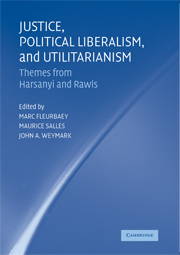Book contents
- Frontmatter
- Contents
- Preface
- List of Contributors
- 1 An Introduction to Justice, Political Liberalism, and Utilitarianism
- PART ONE THEMES FROM RAWLS
- PART TWO HARSANYI'S IMPARTIAL OBSERVER AND SOCIAL AGGREGATION THEOREMS
- PART THREE GOODNESS AND WELL-BEING
- PART FOUR SHARING THE GAINS FROM SOCIAL COOPERATION
- 13 Naturalizing Harsanyi and Rawls
- 14 The Social Contract Naturalized
- 15 An Alternative Model of Rational Cooperation
- PART FIVE RIGHTS AND LIBERTIES
- Index
15 - An Alternative Model of Rational Cooperation
Published online by Cambridge University Press: 09 February 2010
- Frontmatter
- Contents
- Preface
- List of Contributors
- 1 An Introduction to Justice, Political Liberalism, and Utilitarianism
- PART ONE THEMES FROM RAWLS
- PART TWO HARSANYI'S IMPARTIAL OBSERVER AND SOCIAL AGGREGATION THEOREMS
- PART THREE GOODNESS AND WELL-BEING
- PART FOUR SHARING THE GAINS FROM SOCIAL COOPERATION
- 13 Naturalizing Harsanyi and Rawls
- 14 The Social Contract Naturalized
- 15 An Alternative Model of Rational Cooperation
- PART FIVE RIGHTS AND LIBERTIES
- Index
Summary
Introduction
I want to extend here a line of reasoning that I pursued in Rationality and Dynamic Choice (1990). In that book I argued that the standard Bayesian model of expected-utility reasoning needs to be revised to accommodate a capacity, on the part of rational decision makers, to effectively coordinate with their own future selves – to be guided by plans that they have deliberately adopted. I also suggested that an analogous line of reasoning might be employed to show that rational agents could engage in a coordination of their choices with others to a greater extent than the standard theory would seem to admit and, in particular, that they could achieve coordination by following mutually accepted rules. It is this suggestion that I now want to explore more fully. It is not that the standard theory altogether denies the possibility of such coordination. Rather, on its view, rational agents will be disposed to free-ride on the cooperative efforts of others and thus effective cooperation will require the adoption of a system of surveillance and sanctions. In addition, it views the terms of the agreements that rational agents reach as driven by essentially noncooperative considerations, such as the relative bargaining power of the participants. But enforcement schemes require the expenditure of scarce resources, and bargaining based on the principle of to each according to threat advantage tends to generate destabilizing and mutually disadvantageous conflict. The two problems, moreover, appear to be connected in an important way. The sense that one's relationship to others is defined by relative threat advantage is likely to contribute to one's disposition to free-ride whenever one can.
- Type
- Chapter
- Information
- Justice, Political Liberalism, and UtilitarianismThemes from Harsanyi and Rawls, pp. 351 - 386Publisher: Cambridge University PressPrint publication year: 2008
- 1
- Cited by

